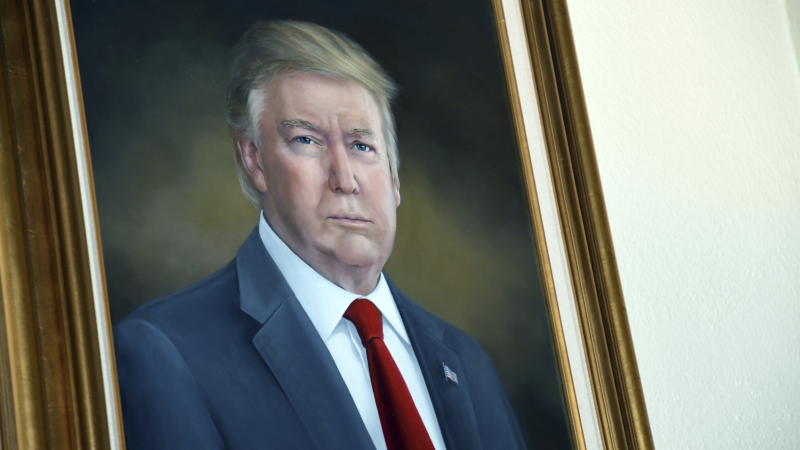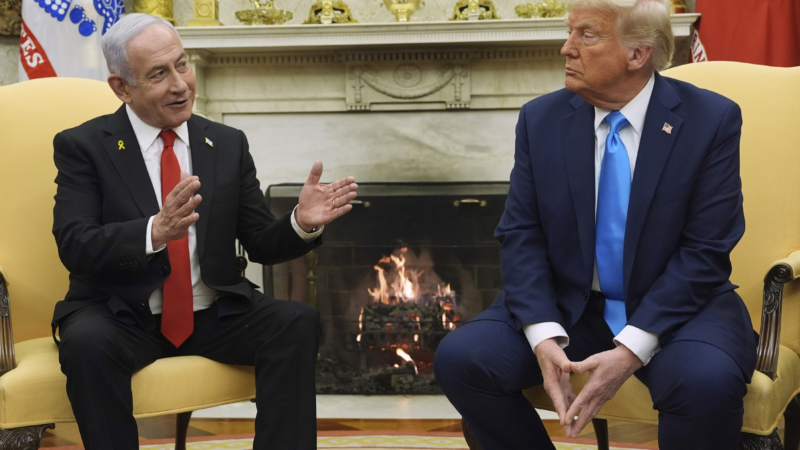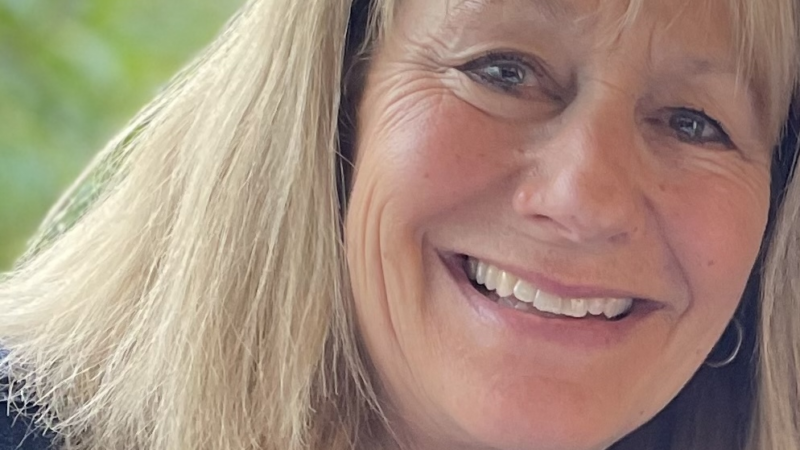Afghans who helped the U.S. are in dangerous limbo after Trump’s order on refugees
Surayya’s flight to the United States was already booked when President Trump ordered a pause on the U.S. Refugee Admissions Program. Not long after, her flight was canceled and her stomach dropped.
“I don’t know what to do,” she said. “If I go back to Afghanistan, I will be prosecuted or even be killed by the Taliban.”
Surayya, who asked NPR not to use her full name for safety reasons, used to work on women’s rights projects with the U.S. Embassy in Kabul. But when the Taliban took control of Afghanistan, Surayya and her children fled to neighboring Pakistan. There, she applied for resettlement in the U.S. and was approved.
Now, Surayya’s future and safety look uncertain, along with tens of thousands of other Afghans who risked their lives working for the U.S. government or military.
During Trump’s first day in office, the president issued an executive order to pause refugee applications and travel plans, citing concerns over the country’s capacity to absorb large numbers of refugees.
It remains unclear how long the suspension will last, but the order does allow the secretary of state and the secretary of homeland security to admit refugees on a “case-by-case basis.” The U.S. State Department did not respond to NPR’s request for comment.
Longstanding pathways for Afghan allies hang in the balance
The U.S. is home to over 200,000 Afghans who arrived as refugees, according to Shawn VanDiver, a military veteran and the president of #AfghanEvac, a nonprofit that helps people from Afghanistan resettle in America.
Around the world, over 40,000 Afghans are still actively pursuing resettlement in the U.S., with more than 10,000 approved to relocate by the U.S. government.
Many of those affected by the pause on the U.S. Refugee Admissions Program (USRAP) are Afghan lawyers and judges who put Taliban fighters behind bars, as well as members of the Afghan military who trained and fought alongside American troops. The families of about 200 active duty U.S. service members are also being impacted, VanDiver said.
“We made a promise to our Afghan allies, and fulfilling that promise is not just about policy — it’s about honor and integrity,” he added.
USRAP is one of the pathways for Afghans who risked their lives to support U.S. missions. The other is called the Special Immigrant Visa (SIV), specifically designed for Afghan interpreters, drivers and other contractors who worked directly with American forces.
The SIV program is in jeopardy too, following a separate executive order suspending foreign aid, including funding for refugee resettlement agencies. The order similarly stalls relocation flights, as well as hinders organizations from processing SIV cases and providing critical travel loans, according to VanDiver.
“This isn’t just a humanitarian issue — it’s an economic one. The ripple effects will be felt across the U.S. as resettlement agencies close their doors and jobs are lost,” he said.
“He is unfortunately putting our lives in grave danger”
Surayya said she was supposed to be evacuated to the U.S. after the Taliban seized Kabul. But like thousands of others, she was not able to get on a plane during America’s chaotic retreat from Afghanistan in 2021.
The exit happened during former President Biden’s time in office, but it was set in motion by the first Trump administration, which signed a deal with the Taliban in 2020 to withdraw after two decades in the country.
While Surayya currently resides in Pakistan, it is not a permanent solution. Over the years, Pakistan has deported hundreds of thousands of Afghans. Without a chance to move to the U.S., Surayya does not know where else to go.
“Police of Pakistan are searching for Afghans,” she said. “I am not safe here. And if I go back to Afghanistan, my life is not safe, my kids’ life is not safe.”
Many Afghans who worked for the U.S. but were unable to escape Afghanistan now live in hiding from the Taliban, like Roshangar, who asked NPR not to include his full name because he’s been on the run.
Roshangar said he used to work alongside American pilots, helping review and approve airstrikes against Taliban fighters. He was on the last step of his application before the refugee program was suspended. Roshangar said he feels that the Trump administration turned its back to America’s Afghan allies.
“He is unfortunately putting our lives in grave danger,” he said.
Veterans rally behind Afghan allies, urging the Trump administration to reverse course
For Army veteran Mark Kirkendall, the issue is deeply personal. “I called these Afghan engineers I worked with my adopted sons,” he said. “That’s how close we are.”
Kirkendall was deployed to Afghanistan over a decade ago. Since then, he kept in regular contact with the engineers he worked with, helping many of them resettle to the U.S.
Kirkendall, who voted for Trump, is hoping the president will make an exemption for Afghan allies. With three engineers still in Afghanistan — and having lost two to the Taliban — Kirkendall said he sees it as a matter of life or death.
“U.S policy has always been to take care of our allies, and we’re not doing a good job of that; we’re failing the Afghan people,” he said.
To Army veteran Alex Waller, who was deployed to Afghanistan in 2017, he believes the U.S. has a moral responsibility to protect those who risked their lives to serve alongside American troops.
“ B y and large, they are productive members of society that want to be here, that want to make good life for themselves, and who are — in my opinion — they’re outstanding people,” he said.
For the past two years, Waller and other veterans have been working with Task Force Argo, a volunteer group dedicated to helping Afghan allies evacuate, to bring to the U.S. a former member of the Afghan military who is currently in Turkey.
Waller said the soldier was known for participating in dozens of raids against the Taliban and helping evacuate a wounded American. Since Waller learned that USRAP was paused, he couldn’t help but wish he had acted more quickly.
“We should not assume that the countries that they are hiding in will continue to, like, let them hang around out of the kindness of their hearts or something,” he said.
Last week, hundreds of veterans signed an open letter to the Trump administration organized by #AfghanEvac, urging that Afghans who put themselves in harm’s way working for the U.S. should be exempt from the executive order blocking refugee pathways. They argued that failing to do so would jeopardize America’s credibility with potential allies in future conflicts:
“To abandon them now would be a betrayal of the values we fought to defend and the trust built through years of shared struggle and sacrifice.”
Transcript:
LEILA FADEL, HOST:
Hours after being sworn in, and with a stroke of the pen, President Trump suspended the U.S. refugee program. He argues the country doesn’t have the capacity to absorb large numbers of refugees, so thousands of people who were waiting to reach safety in the U.S. after years of vetting found themselves in limbo. As NPR’s Diaa Hadid reports, they include thousands of Afghans who worked with the United States and those who fought alongside U.S. forces.
SURAYYA: This is not easy. Sorry (crying).
DIAA HADID, BYLINE: Surayya asks not to use her full name because her safety is at risk. She used to work on women’s rights projects with the U.S. Embassy in Kabul.
(CROSSTALK)
HADID: But she fled the country after the Taliban overran the Capitol more than three years ago. She knew her life was in danger because shadowy assassins believed to be linked to the Taliban had been killing women like her even before they seized power, feminists collaborating with the enemy to spread immoral Western ideas. Surayya went to neighboring Pakistan, and from there she applied for asylum in the U.S., and it was accepted.
SURAYYA: We were waiting for the flight. Unfortunately, now it is, like, suspended.
HADID: Suspended after President Trump suspended America’s refugee program. Surayya says she and her family can’t believe it.
SURAYYA: It’s a shock, believe me. It’s a shock, and I don’t know what to do. If I go back to Afghanistan, I will be prosecuted or even be killed by Taliban (crying).
HADID: She says it wasn’t meant to be like this. She was meant to be evacuated after the Taliban overran Kabul, but she and thousands of others who had worked with U.S. diplomats and forces in Afghanistan weren’t able to get on planes during America’s chaotic exit from the country.
(APPLAUSE)
HADID: That exit was set in motion after the first Trump administration signed a deal with the Taliban to withdraw after nearly 20 years in the country. As the U.S. left, service members lobbied for their Afghan allies to be given asylum.
SHAWN VANDIVER: Afghan service members who fought alongside us, bled alongside us.
HADID: Shawn VanDiver is from AfghanEvac, a nonprofit that helps resettle America’s Afghan allies. He says those people also include civilians.
VANDIVER: These are lawyers and judges, prosecutors who put the Taliban away.
HADID: He says about 200,000 Afghans have already arrived as refugees to the United States. Several thousand more came into the country through a different pipeline, and there’s about another 50,000 still waiting for asylum. They’re now in limbo. VanDiver says he hopes President Trump’s administration…
VANDIVER: Can do a carve-out for our wartime allies.
HADID: Many of them, like Surayya, are waiting in neighboring Pakistan. They’re not welcome. Pakistan has been deporting hundreds of thousands of Afghans. And Surayya, whose asylum to the U.S. has been suspended, is afraid she and her family will be forced to return.
SURAYYA: Police of Pakistan are searching for Afghans. I’m not safe here. And if I go back in Afghanistan, my life is not safe. My kid’s life is not safe. What should I do?
HADID: Others who were waiting to fly to the U.S. are hiding in Afghanistan, like Roshangar. He asks we don’t use his full name because he’s been on the run.
ROSHANGAR: We have been constantly changing our places.
HADID: He says the Taliban want his head because…
ROSHANGAR: I had worked alongside U.S. pilots, reviewing and approving, signing airstrikes against Taliban.
HADID: Roshangar says he was waiting to do a medical check. It’s one of the last steps in the U.S. asylum process. Now?
ROSHANGAR: The Trump administration already turned its back to us. He is unfortunately putting our lives in grave danger.
HADID: Roshangar says suspending asylum to people like him goes beyond the harm. It will likely cause America’s Afghan allies…
ROSHANGAR: I think Mr. Trump is sending messages to his allies that we are not going to keep our promise. We will turn our back to you when it’s a dark time.
HADID: He says maybe one day when America seeks help again, former allies, countries and people will turn their backs, too.
Diaa Hadid, NPR News, Mumbai.
The artist behind ‘the worst’ Trump portrait defends her work
The painting, which was commissioned by Republicans, has hung in Colorado's state Capitol since 2019. Trump follows other U.S. presidents who weren't flattered by their depictions.
Are UAB officials mum about grant cuts because they fear a spiteful president?
Cuts to federal research grants could cost UAB $70 million a year, leading to layoffs and economic impacts beyond the campus. Some faculty and area leaders want UAB to be more vocal against the Trump administration cutbacks.
The (artificial intelligence) therapist can see you now
Many AI products claim to deliver mental health therapy, but with little quality control. But new research suggests with the right training, AI can be effective at helping people.
Netanyahu is set to meet Trump to discuss Israeli hostages in Gaza and U.S. tariffs
Israeli Prime Minister Benjamin Netanyahu will meet with President Trump expecting to discuss tariffs, hostages and war in Gaza and other issues.
Colon cancer survivors who exercise regularly live longer
Colon cancer is on the rise in younger people in the U.S. New research shows regular exercise can help survivors live longer — in some cases even longer than people who didn't have cancer.
A young boy safely returned to his family after getting lost at the NYC Marathon
After Nancy Willis finished the New York City Marathon, she went to greet her family, only to discover that her 8-year-old son was missing. After a frantic search, a woman appeared with the boy.









